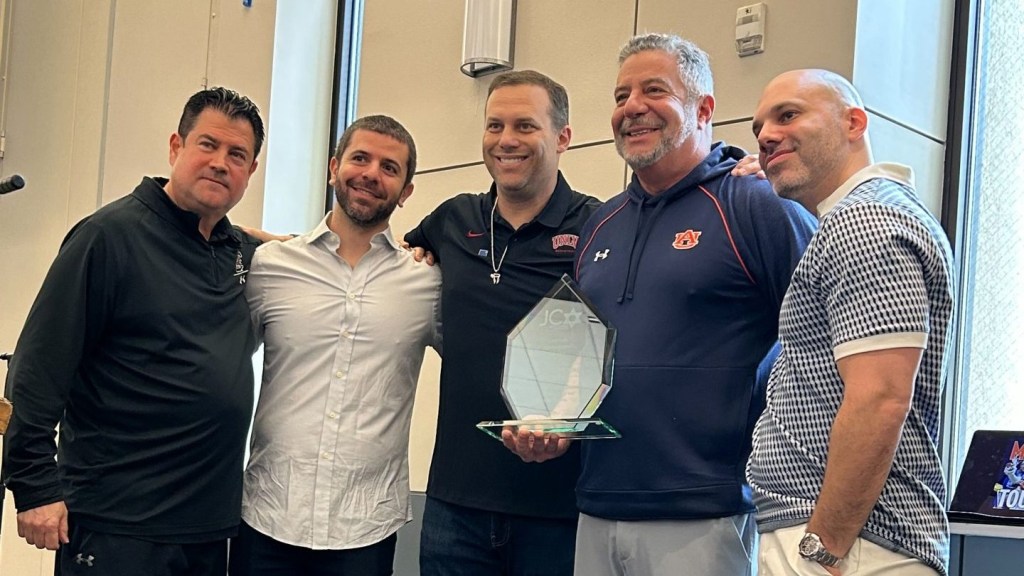Despite being a Division III program at a small private school in Manhattan, the Yeshiva University men’s basketball team is no stranger to the spotlight.
Last year, Jewish actress Mayim Bialik announced she would produce a film about the team’s NCAA D-III record 50-game winning streak that drew national attention in 2021. Star guard Ryan Turell led the program at the time, and then went on to play for the Detroit Pistons G League—the first Orthodox Jewish basketball player to be selected in the G League Draft.
Now, the Yeshiva Maccabees are the subject of yet another film—this time, a documentary about the 2023-24 men’s basketball season, which tipped off shortly after the Oct. 7 terror attack in Israel. It follows the team as the players, including top scorer Zevi Samet, and coach Elliot Steinmetz, attempt to balance basketball, the ongoing war between Israel and Hamas, and rising antisemitism on college campuses across the country.
“These are normal student-athletes that could be at any school—they just happen to be Jewish,” Steinmetz tells Front Office Sports. He says he hopes the documentary sheds light on “the stuff that’s going around in terms of antisemitism on college campuses and around the country… and the effect that it’s had on, just, normal everyday kids who are just trying to play ball and get a college degree.”
“Rebound: A Year of Triumph and Tragedy at Yeshiva University Basketball,” which premiered on Fox Nation this week, was produced by Emmy award-winner Pat Dimon, known for multiple sports documentaries including “College Sports, Inc.” about the new NIL (name, image, and likeness) era.
The documentary also comes just days after three Jewish coaches participated in the men’s Final Four—a fact celebrated by the now 20-year-old organization, the Jewish Coaches Association, in San Antonio. (Steinmetz said he had spoken with Auburn’s Bruce Pearl, another coach who has been outspoken about antisemitism, earlier in the weekend to congratulate him on his season.)

On Oct. 7, 2023, Steinmetz and several other players were in Israel. When they finally made their way back to New York after the attack, basketball was the last thing on their minds. “The first conversation we had [as a team], nobody wanted to be there,” Steinmetz says. Some players were concerned about the well-being of friends and family members, while six of the players were waiting to hear if they would be called up from reserves of the Israeli Defense Forces (the IDF has a system of conscription for all citizens).
“The first conversation we had, was, hey, this was not really a choice of canceling the season so to speak—but we need to make it something that’s worth it outside the court,” Steinmetz says.
In January 2024, two months after the season began, the Maccabees took a trip to Israel—the NCAA allows programs to take one international trip every few years. They played one exhibition game, but mostly spent time with family and friends, visited the sites of the attack and spoke with a released hostage, and volunteered.
Shortly before the trip, Steinmetz was pitched the documentary by university administrators and film representatives over Zoom. It was then that the team really realized they could use their season as a way to raise awareness about combatting antisemitism at home—especially on college campuses. The players didn’t earn NIL dollars for appearing in the program, Steinmetz says; popular documentaries like “Pitino: Red Storm Rising,” a VICE TV docu-series following St. John’s men’s basketball school that has reportedly offered players NIL dollars.
He hopes the documentary shows not just the facts about the Oct. 7 attacks, but provides an emotional window into the Jewish and Israeli athlete population in the aftermath of the war, concerned about friends and family in Israel and fighting antisemitism in the U.S.
Steinmetz says that throughout the 2023-24 season, coaches from across the country called him asking for advice about how to support Jewish players on their teams—and found a concerning lack of knowledge about the experience of Jewish students on campus that he hopes the documentary will help mitigate.
Ultimately, the Maccabees didn’t make it to the NCAA tournament that year after going 16-12 (they had a slightly better season this year, going 18-11 and making the first round of the D-III tournament). But the 2023-24 season was a success in other ways. The documentary shows “the raw emotion of what regular people here, whether it was the Israelis…or just myself or some of the other Jewish student-athletes were going through,” Steinmetz says. “And I think it humanizes it in a way that wouldn’t be shown on the news.”





![[Subscription Customers Only] Jun 15, 2025; Seattle, Washington, USA; Botafogo owner John Textor inside the stadium before the match during a group stage match of the 2025 FIFA Club World Cup at Lumen Field.](https://frontofficesports.com/wp-content/uploads/2026/02/USATSI_26465842_168416386_lowres-scaled.jpg?quality=100&w=1024)
![[Subscription Customers Only] Jul 13, 2025; East Rutherford, New Jersey, USA; Chelsea FC midfielder Cole Palmer (10) celebrates winning the final of the 2025 FIFA Club World Cup at MetLife Stadium](https://frontofficesports.com/wp-content/uploads/2026/02/USATSI_26636703-scaled-e1770932227605.jpg?quality=100&w=1024)










